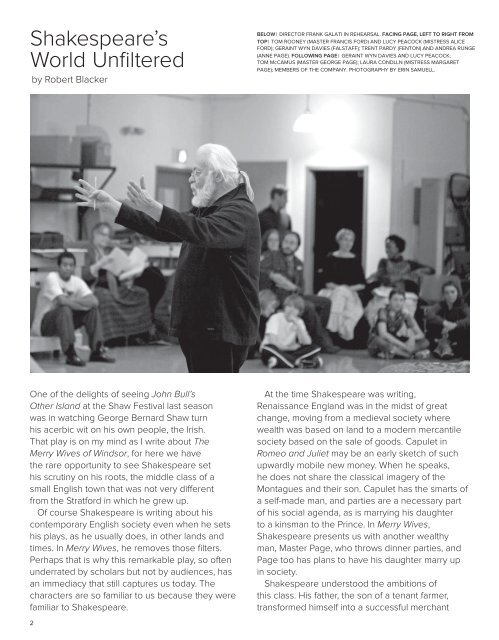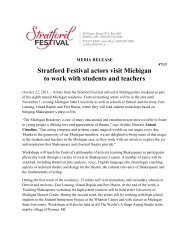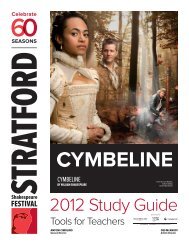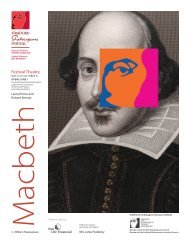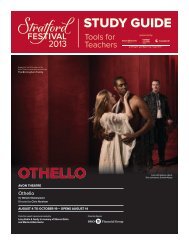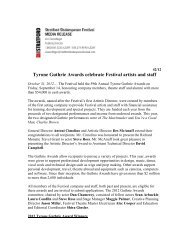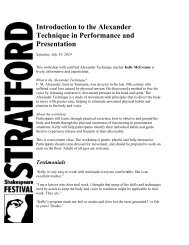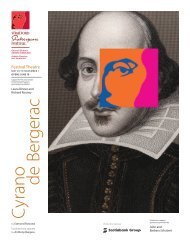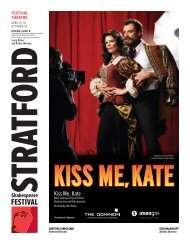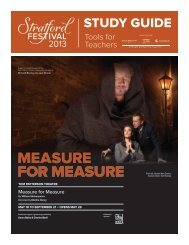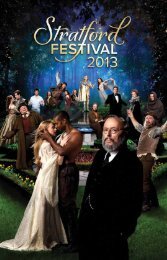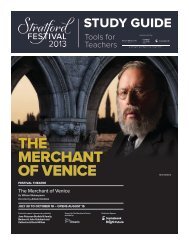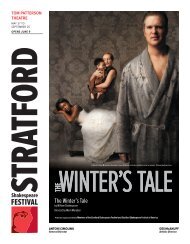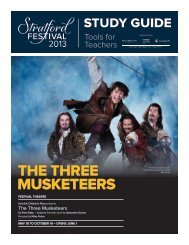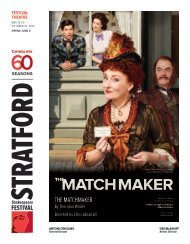The merry wives of windsor - Stratford Festival
The merry wives of windsor - Stratford Festival
The merry wives of windsor - Stratford Festival
You also want an ePaper? Increase the reach of your titles
YUMPU automatically turns print PDFs into web optimized ePapers that Google loves.
Shakespeare’s<br />
World Unfiltered<br />
by Robert Blacker<br />
Below | Director Frank Galati in Rehearsal. Facing page, left to right from<br />
top| Tom Rooney (Master Francis FORD) and Lucy Peacock (Mistress Alice<br />
Ford); Geraint Wyn Davies (Falstaff); Trent Pardy (Fenton) and Andrea Runge<br />
(Anne PAGE). Following page | Geraint Wyn Davies and Lucy Peacock;<br />
Tom McCamus (Master George Page); Laura Condlln (Mistress Margaret<br />
PAGE); Members <strong>of</strong> the company. Photography By Erin Samuell.<br />
One <strong>of</strong> the delights <strong>of</strong> seeing John Bull’s<br />
Other Island at the Shaw <strong>Festival</strong> last season<br />
was in watching George Bernard Shaw turn<br />
his acerbic wit on his own people, the Irish.<br />
That play is on my mind as I write about <strong>The</strong><br />
Merry Wives <strong>of</strong> Windsor, for here we have<br />
the rare opportunity to see Shakespeare set<br />
his scrutiny on his roots, the middle class <strong>of</strong> a<br />
small English town that was not very different<br />
from the <strong>Stratford</strong> in which he grew up.<br />
Of course Shakespeare is writing about his<br />
contemporary English society even when he sets<br />
his plays, as he usually does, in other lands and<br />
times. In Merry Wives, he removes those filters.<br />
Perhaps that is why this remarkable play, so <strong>of</strong>ten<br />
underrated by scholars but not by audiences, has<br />
an immediacy that still captures us today. <strong>The</strong><br />
characters are so familiar to us because they were<br />
familiar to Shakespeare.<br />
At the time Shakespeare was writing,<br />
Renaissance England was in the midst <strong>of</strong> great<br />
change, moving from a medieval society where<br />
wealth was based on land to a modern mercantile<br />
society based on the sale <strong>of</strong> goods. Capulet in<br />
Romeo and Juliet may be an early sketch <strong>of</strong> such<br />
upwardly mobile new money. When he speaks,<br />
he does not share the classical imagery <strong>of</strong> the<br />
Montagues and their son. Capulet has the smarts <strong>of</strong><br />
a self-made man, and parties are a necessary part<br />
<strong>of</strong> his social agenda, as is marrying his daughter<br />
to a kinsman to the Prince. In Merry Wives,<br />
Shakespeare presents us with another wealthy<br />
man, Master Page, who throws dinner parties, and<br />
Page too has plans to have his daughter marry up<br />
in society.<br />
Shakespeare understood the ambitions <strong>of</strong><br />
this class. His father, the son <strong>of</strong> a tenant farmer,<br />
transformed himself into a successful merchant<br />
2


